Francisca Niklitschek
Contributing Authors
Dmitrij Achelrod PhD
Francisca Niklitschek
We are living at a civilizational threshold. Every system we depend on, ecological, economic, political, social, is showing signs of exhaustion, fragmentation, and collapse. And yet, something else is stirring beneath the rubble: a quiet but potent call to remember, to reimagine, to reweave the fabric of our collective future.
This isn’t just a crisis of climate, or inequality, or trust. It’s a metacrisis: an entangled polycrisis of systems failure rooted in a deeper disconnection between humans and nature, mind and body, self and other, doing and being. At the heart of this rupture lies a question not of technology or policy alone, but of consciousness.
Our outer structures mirror our inner architecture, which means that transforming the world requires more than better strategies and it demands a shift in the interior condition of those who lead. This is the missing piece in many transformation efforts: the inner dimension, the psyche, the soul, the nervous system, the values we embody when no one is watching, in how we show up in our homes, our friendships, our communities. Leadership in this sense, is not a title, is a practice of presence available to all of us.
In this blog, we’ll explore why inner work is a form of deep activism, essential for any leader seeking to meet this moment with integrity, vision, and service.
We’ll explore:
- What the metacrisis is and why conventional solutions keep falling short,
- The six essential pillars of conscious leadership in this time of profound uncertainty,
- How to cultivate and embody that mindset through daily practices.
This is not a map for perfection, it is a compass for leaders willing to walk the edge between breakdown and breakthrough, with ethical clarity and an open heart. Because the world doesn’t need heroes, it needs more humans who have come home to themselves.
Metacrisis and Why Technocratic Solutions Are Not Enough
What Is the Metacrisis
We live in a moment unlike any other, a moment where crises are not only multiplying, but entangling: ecological, economic, social, political, psychological, spiritual. Not isolated problems with clear solutions, but deeply interwoven breakdowns of systems, stories, and sense-making.
Maybe you have heard about the concept of “polycrisis”, which refers to multiple, simultaneous crises (e.g., climate change, pandemics, economic instability, geopolitical conflicts, inequality) that interact in ways that amplify their impacts. The term emphasizes the convergence of distinct crises, where the combined effect is greater than the sum of individual parts. A good example is climate-driven migration which exacerbates political instability, which in turn disrupts economic systems.
Metacrisis is a broader, more philosophical concept that goes beyond the sum of individual crises to address the underlying drivers. It focuses on the root causes, such as flawed cultural values, dysfunctional institutions, or unsustainable systems (e.g., capitalism, extractivism, individualism), that generate and perpetuate multiple crises. Metacrisis suggests a deeper, systemic failure of humanity’s ability to navigate complexity, often tied to issues like short-term thinking, misaligned incentives, or inadequate sensemaking [1].
This is the metacrisis: A crisis of crises. It’s a rupture in the very fabric of how we relate to the world, to each other, and to what it means to be human. It’s not just climate change, it’s the worldview that treats nature as a resource to be managed. Not just mental health collapse, it’s a culture of disconnection, consumerism and hyper-individualism. Not just institutional failure, it’s a hollowing of trust, meaning, and collective vision.
The Limits of the Technocratic Mind
In the face of such complexity, the dominant response has been technocratic: smarter policies, better metrics, AI-driven optimization, decarbonization targets, etc. These are not wrong, but they are incomplete [2] [3] [4] [5]. They assume we can fix the world without changing ourselves, that better tools will save us from the consequences of a consciousness that created the problem in the first place.
But here’s the hard truth: No system upgrade can mend the fractures in our inner world. We are not merely facing a lack of information or technology. We are facing a failure of perception, purpose, and presence. A civilization-level disconnection from self, from nature, from one another.
Technocratic fixes often operate like bandages on a broken bone. They may temporarily reduce symptoms, but they leave the deeper fracture unhealed:
- The way we objectify the living world.
- The way we valorize speed over wisdom and depth.
- The way we measure progress by extraction and domination.
- The way we outsource responsibility and avoid inner reckoning.
As long as these patterns remain intact, no amount of efficiency will lead to regeneration. No quantity of innovation will lead to transformation. The system will keep recreating itself: smarter, faster and emptier.
Why an Inner Shift Is Essential
What’s needed is not just outer change, because:
- Without emotional maturity, our innovations become fortresses for the ego, not bridges for the collective.
- Without self-awareness, we repackage extraction as progress and call it sustainability, replicating the very paradigms we claim to transcend.
- Without inner spaciousness, we mistake speed for effectiveness and urgency for importance.
- Without spiritual grounding, we interpret complexity as chaos and lose our orientation to what truly matters. When we lose connection to the sacred, we think the world is broken… when really, we are.
The metacrisis is asking something unprecedented of us. If we focus only on external innovation, we risk accelerating collapse. But if we dare to evolve within, we open the door to a different kind of future: one we can co-create, consciously and collectively.
So, this is a threshold. And how we cross it depends on who we are becoming, individually and collectively.
Architects of Change: Building a Framework for a Fractured World
To lead in this context, is to become the kind of person who can hold the questions, the paradoxes, the pain, and still act with clarity and care. This kind of leadership is rooted in inner coherence, emotional intelligence and depth.
What does it take? Here are the six pillars of the mindset we believe are essential to lead in times of metacrisis:
1. Radical Self-Awareness
You can’t transform a system you are unconsciously replicating within yourself, this is the foundation. Many of the world’s most persistent crises are not just the result of broken systems, but of the inner states of the people maintaining them. Systems are extensions of consciousness; they reflect the values, fears, and assumptions of their creators. Without deep self-awareness, leaders risk reinforcing the very patterns they seek to change even under the banner of innovation or sustainability. Inner transformation becomes not just a personal journey, but a strategic work for systemic change [6] [7] [8] [9].
Transformational leadership begins within. It requires the courage to turn inward, to examine the hidden architecture of your psyche: the limiting beliefs you’ve inherited, the blind spots shaped by culture and conditioning, the unresolved wounds that trigger your reactions, and the ego patterns that filter what you see and how you lead. It’s not about becoming a flawless person, but about becoming someone who can see clearly, compassionately, continuously.
We cultivate this through practices that reveal our inner landscape, such as shadow work (integrating the parts of ourselves we’ve suppressed), somatic awareness (listening to the wisdom in our bodies), and self-reflection that goes beyond the surface. We can accelerate this journey by working with a coach or therapist and by actively seeking feedback not to affirm our identity, but to expand it.
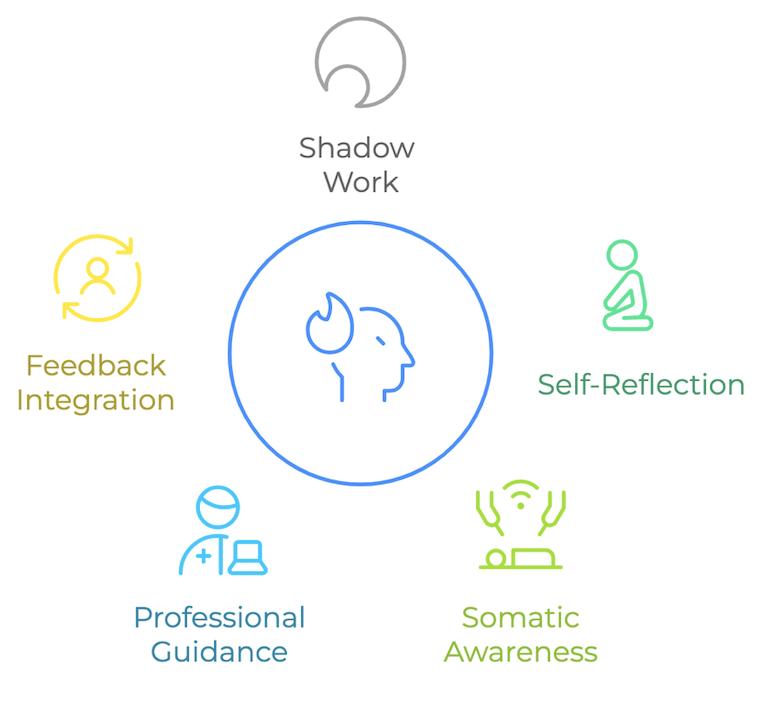
2. Emotional Maturity and Nervous System Resilience
In times of collapse and uncertainty, emotional intelligence and nervous system resilience become core capacities for effective leadership and organizational adaptability during transitions [10] [11] [12] [13].
This pillar is about becoming a leader whose presence doesn’t escalate chaos but anchors safety, whose emotional landscape is not repressed but integrated. This doesn’t mean being calm at all times, but means being able to stay present in the storm, metabolize fear and grief, and respond rather than react.
We build this capacity by learning to navigate our inner storms, using tools like breathwork and other nervous system regulation techniques. This can also require trauma-informed leadership, which recognizes how past experiences shape our present reactions.
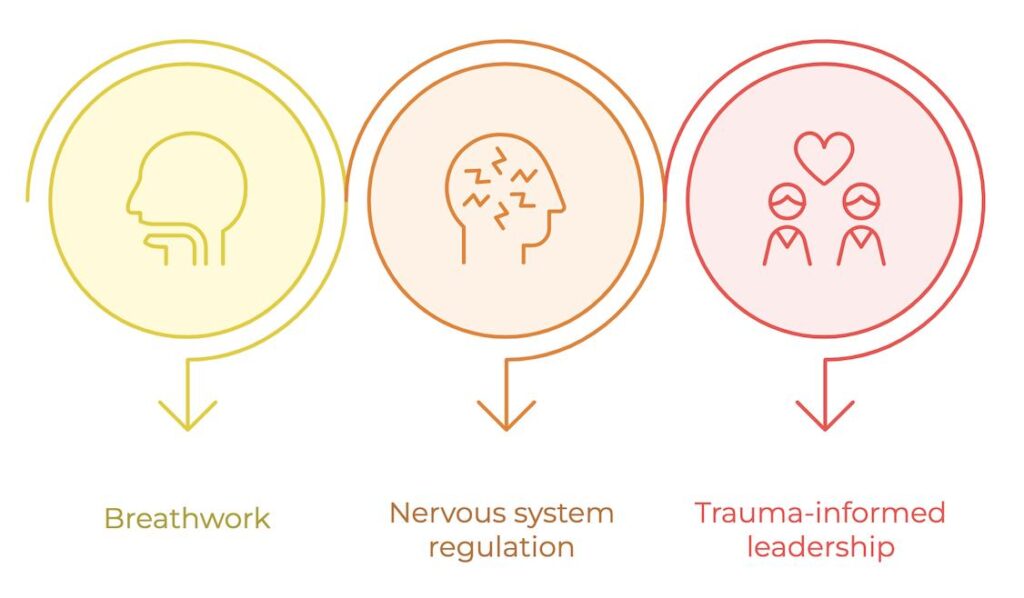
3. Systemic Literacy: Seeing the Whole
The metacrisis is not a collection of isolated issues, it is an entangled web of feedback loops. Navigating this complexity requires a leadership grounded in systems thinking, one capable to zoom out far enough to see the whole, and zoom in far enough to honor the parts.
Leaders who cultivate systemic literacy can develop the ability to recognize patterns beneath events, identify root causes rather than symptoms, and anticipate how interventions in one part of the system can ripple across the whole [14] [15] [16] [17]. This mindset fosters more nuanced, adaptive, and ethically grounded decisions.
By shifting from linear thinking to dynamic awareness, leaders become better equipped to engage with tipping points, cascading risks, and the deeper interdependencies that define our time.
But this is not a theoretical exercise, it’s a way of perceiving. We develop it by studying systems thinking (understanding the relationships and feedback loops in a system), exploring concepts like planetary boundaries and ecological interdependence to grasp our place in the global web of life, and by intentionally sensing patterns across time and scale.
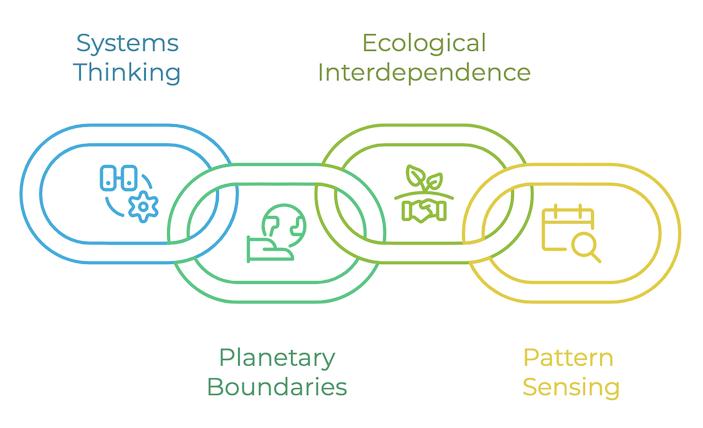
4. Moral Courage and Value Clarity
We live in a world where short-term gains are rewarded, and conformity is often safer than authenticity, staying aligned with what truly matters requires courage.
Values are not just personal preferences, they are the invisible architecture of systems. In times of transformation, they determine what gets protected, what gets prioritized, and what gets reimagined. Leaders with value clarity can serve as stabilizing forces amidst uncertainty, offering direction that is rooted not in ideology, but in integrity. Moral courage allows these values to move from theory into practice: shaping cultures, guiding policies, and anchoring systemic transitions in something deeper than convenience or consensus. Without this foundation, change risks becoming performative or misaligned. But with it, transformation becomes principled, coherent, and sustainable [18] [19].
This pillar is about clarity in complexity, and the ability to act from a place of alignment rather than reaction. Moral courage is the bridge between what you believe and how you lead. It transforms values from abstract ideals into embodied choices, moment by moment, especially when it’s hard.
To make this a reality, we forge this clarity through an ongoing commitment to alignment. This includes values clarification exercises that make our ethical compass visible, daily check-ins to see if we’ve lived our values, and ethical reflection and discernment practices that help us make choices with integrity in moments of ambiguity.
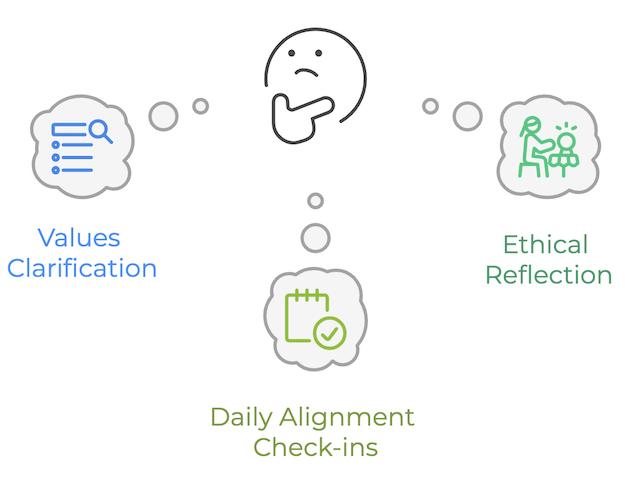
5. Deep Empathy and Relational Wisdom
There can be no true systems change without a transformation in how we relate to one another [20] [21] [22]. At its core, systemic transformation is relational. It’s not just about shifting policies or structures, it’s about shifting the quality of our presence with each other.
Leadership in this era is no longer defined by control or charisma, but by attunement to the unspoken pain in the room, to the wisdom of collective intelligence, to the voices long silenced or sidelined. Deep empathy is a strategic capacity that allows us to see the human and more-than-human [23] ecosystem as it truly is: interconnected, dynamic and alive.
Relational wisdom, then, is the ability to navigate complexity with heart. It’s knowing how to hold paradox, how to listen without needing to fix, how to build spaces where trust is not demanded but earned. When we commit to these practices, we don’t just change conversations, we change cultures.
This pillar is about cultivating a relational field where safety, dignity, and transformation are not just possible, but inevitable. We cultivate this through our relationships, practicing nonviolent communication to connect beyond conflict, creating listening circles for collective wisdom, and engaging in anti-oppression work that helps us see the world from different perspectives. And humility becomes our guide in multicultural settings.
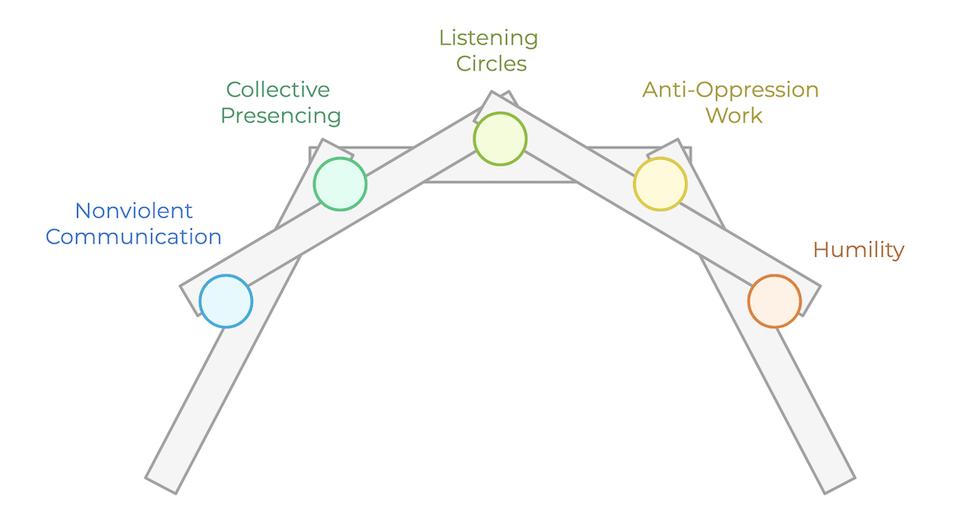
6. Inner Groundedness in Mystery and Meaning
If we are to hold the immense complexity of our times, we must be anchored in something deeper than intellect, strategy, or performance. This final pillar invites us to recognize a truth often left unspoken in leadership spaces: the metacrisis is not only ecological, political, or economic, it is profoundly spiritual. It confronts us with existential questions: Who are we, really? What do we belong to? What is truly worth protecting, loving, and serving?
By spirituality, we don’t mean religion or dogma. We mean the innate human longing for connection to something larger than the self: something timeless, mysterious, and meaningful. This kind of spirituality can be fiercely secular and yet deeply sacred. It’s the reverence we feel in the face of a forest, the awe evoked by a night sky, the grief that honors life, the joy that doesn’t need a reason. It is the soil from which moral courage, compassion, and ecological responsibility can grow.
Without this inner rootedness, systems change risks becoming superficial, just another iteration of control disguised as progress. But when leaders (and us) are connected to meaning, they can act not just from urgency, but from reverence. They can lead not only with their minds, but with their hearts and spirits aligned.
This kind of grounded spirituality fosters resilience, awakens ethical clarity, and redefines what we consider sacred through tangible commitments to life: the Earth, future generations, biodiversity, justice, beauty, and belonging [24] [25].
Conscious leaders are not afraid to bring soul back into the conversation. They are guided not only by metrics and deadlines, but by silence, wonder, and a deeper trust in the regenerative intelligence of life.
This shift requires us to cultivate a connection to what’s sacred beyond the self. This can be done through contemplative inquiry (deep, open-ended questioning), finding silence for inner listening, and connecting with the more-than-human world as a source of awe and guidance. We learn to ask deeper questions like “What is sacred?”, “What are we truly here to serve?” instead of just “What works?”.
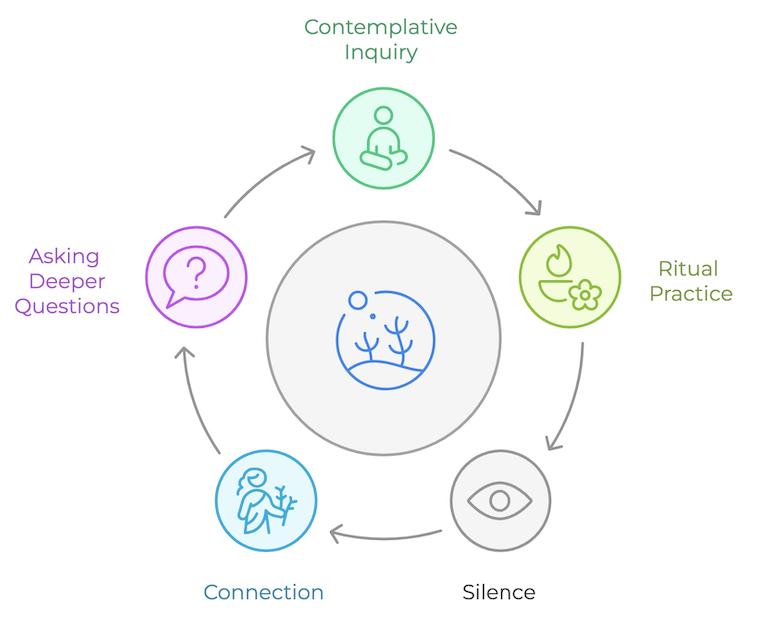
These pillars are not checkboxes, they are invitations to become the kind of leaders – and people – this world so urgently needs. Not managers of crisis, but stewards of regeneration. To lead in the metacrisis is to become both more whole and more humble, and it’s about seeing that the quality of our inner world shapes the fate of the outer one.
Because no system can evolve beyond the consciousness of those who shape it. And so we begin, again and again, from the inside out.
Daily Practices for a Mindset That Can Meet the Metacrisis
This is a discipline of becoming. It is shaped in the quiet moments and the small choices. So what might that look like? Below, we’ll offer a set of daily rituals to get you started on this path.
1. Slow Down to See Clearly
In a world addicted to speed, slowing down is a radical act: Make space in your day to simply notice: your body, your thoughts, the tone of your voice, the way you walk into a room.
“The times are urgent; let us slow down.” – Bayo Akomolafe
Why? Because clarity begins with stillness. When we slow down, we become less driven by unconscious patterns and more attuned to what is truly needed.
2. Expand Your Circle of Care
The metacrisis is a crisis of fragmentation: a relational crisis, as we already talked before. It is the consequence of forgetting how deeply intertwined we are with all of life. We’ve drawn our circles of care too small, confined to what’s convenient, familiar, profitable. But to cultivate a regenerative mindset, we must stretch our hearts beyond the habitual.
- Practice seeing through another’s eyes, especially someone you struggle to understand.
- Spend time in nature: not as scenery, but as kin.
- Let your choices ask: Who or what does this impact beyond me?
Care is revolutionary. It rewires how we relate to power, to purpose, to possibility. It changes how we design systems, how we show up in conflict, how we define success. It reminds us that to serve life is to see ourselves as part of it, not above it.
3. Do Inner Work as Civic Duty
Amidst global collapse, the most powerful thing we can do for the world is tend to our inner landscape. It’s how we metabolize fear, grief, shame so we don’t project them onto the world as control, violence, or apathy.
- Keep a journal. Not just of what you think, but of what you feel.
- Learn to sit with discomfort without trying to fix it.
- Engage in shadow work: what parts of yourself are you still outsourcing, blaming, disowning?
And the beautiful part is that this is not therapy for the self alone, It’s soul stewardship for collective transformation.
4. Dialogue That Changes You
The metacrisis won’t be solved through better arguments. It will be softened through better listening.
- Enter conversations not to convince, but to be changed.
- Listen without preparing your response.
- Speak not to dominate, but to connect.
- Stay open to being surprised.
Let your conversations become spaces where new futures are rehearsed.
5. Practice Micro-Integrity
Systems are changed through small acts of alignment and are shaped by moments no one sees. What you tolerate, how you speak, the promises you keep, the ways you show up when no one is watching, these are the daily rituals through which integrity is forged.
Ask yourself each evening: Did I live today in service of what matters most? Integrity is not perfection, but honesty.
Micro-integrity is how we earn the trust of the future.
6. Stay in Relationship with the Mystery
As we discussed before, facing the metacrisis is not just a technical challenge, it is a spiritual initiation. You will not always know what to do, you’re not supposed to. But you can stay in relationship with the unknown, with reverence instead of fear.
- Create sacred time: 10 minutes a day to sit in silence, not for answers but for presence.
- Let beauty touch you: A sunrise. A piece of music. The sound of wind through leaves. Let it pierce the numbness.
- Ask deeper questions than “What should I do?” Try: What kind of human do I want to become in these times?
7. Embody Regenerative Rhythms
You are not a machine, you are an ecosystem. And ecosystems don’t move in straight lines: they pulse, spiral, rest, renew.
Sense your seasons, listen to your body, rest as deeply as you strive. When we live in rhythm, we begin to lead from life.
Regeneration begins with the body.
8. Create Beauty as an Act of Resistance
Beauty is resistance. It is how we remind the world, and ourselves, that life is still worth loving.
Cook with care. Write a line of poetry. Tend a plant. Offer kindness with no transaction. Beauty awakens us because to feel awe is to remember what’s sacred. And to remember what’s sacred… is to start protecting it.
And what we protect with love, has a chance to heal.
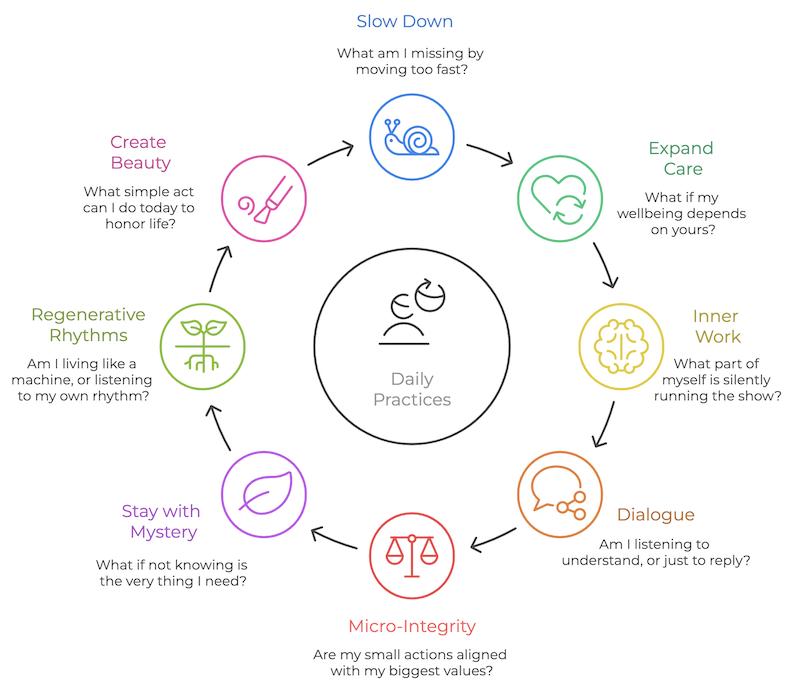
This is why spaces that hold and deepen inner development are becoming essential infrastructure for transformation. Across the world, a growing number of spaces are emerging to foster this process, including retreats, group processes, and learning environments dedicated to transformation. One such space is the Evolute Institute, which offers immersive programs designed to help seekers navigate inner thresholds and develop the psychological resilience and clarity needed to meet this moment.
Conclusion: From Inner Shift to Collective Transformation
The metacrisis is a mirror, reflecting back the deeper disconnection at the heart of our civilization. It asks us to rethink not only what we do, but who we are as humans. The future we long for will not emerge from more of the same: more speed, more control, more surface-level fixes, but from a radical shift in consciousness that begins from the inside-out, a world re-woven by awakened communities of humans who have remembered how to be in right relationship with self, with each other, with life.
“No amount of new technology, computers and Internet, space technology, nanotechnology, or biotechnology will stop continuing warfare and racism and environmental destruction. This is a pivotal point in our history. The powers of science and technology now have to be matched by the inner developments of humanity” – Jack Kornfield
In choosing to do this inner work, we don’t just prepare ourselves to lead through crisis, we become part of the deeper transformation that this moment calls for. The invitation is simple, but radical:
Tend to the soil of your inner world, as the deepest form of responsibility we can take.

Bibliography
[1] The Consilience Project, The Psychological Drivers of the Metacrisis: John Vervaeke Iain McGilchrist Daniel Schmachtenberger, (Dec. 05, 2023). Accessed: July 09, 2025. [Online Video]. Available: https://www.youtube.com/watch?v=-6V0qmDZ2gg
[2] ‘Interrogating Technology‐led Experiments in Sustainability Governance – Bernards – 2020 – Global Policy – Wiley Online Library’. Accessed: July 09, 2025. [Online]. Available: https://onlinelibrary.wiley.com/doi/10.1111/1758-5899.12826
[3] M. H. Huesemann, ‘The limits of technological solutions to sustainable development’, Clean Technol. Environ. Policy, vol. 5, no. 1, pp. 21–34, Mar. 2003, doi: 10.1007/s10098-002-0173-8.
[4] E. Bertsou and D. Caramani, Eds, The Technocratic Challenge to Democracy. London: Routledge, 2020. doi: 10.4324/9780429342165.
[5] ‘Reliance on Technical Solutions to Environmental Problems: Caution Is Needed | Environmental Science & Technology’. Accessed: July 09, 2025. [Online]. Available: https://pubs.acs.org/doi/10.1021/acs.est.5b01235
[6] ‘Emperors With Clothes On: The Role of Self-awareness in Developing Effective Change Leadership: Journal of Change Management: Vol 10, No 4’. Accessed: July 09, 2025. [Online]. Available: https://www.tandfonline.com/doi/abs/10.1080/14697017.2010.516483
[7] L. Galleno, ‘Revitalizing the Self: Assessing the Relationship between Self-awareness and Orientation to Change’, Jan. 2013, Accessed: July 09, 2025. [Online]. Available: https://www.academia.edu/110230938/Revitalizing_the_Self_Assessing_the_Relationship_between_Self_awareness_and_Orientation_to_Change
[8] ‘Being Awareness-Based Systems Change | Journal of Awareness-Based Systems Change’. Accessed: July 09, 2025. [Online]. Available: https://jabsc.org/index.php/jabsc/article/view/9093
[9] ‘Profound Self-Awareness and the Need to Explore Drivers and Blockers | SpringerLink’. Accessed: July 09, 2025. [Online]. Available: https://link.springer.com/chapter/10.1007/978-981-13-6276-7_2
[10] ‘Regulating Emotionality to Manage Adversity: A Systematic Review of the Relation Between Emotion Regulation and Psychological Resilience | Cognitive Therapy and Research’. Accessed: July 09, 2025. [Online]. Available: https://link.springer.com/article/10.1007/s10608-020-10186-1
[11] M. Ungar, ‘Modeling multisystemic resilience: Connecting biological, psychological, social, and ecological adaptation in contexts of adversity’, in Multisystemic resilience: Adaptation and transformation in contexts of change, New York, NY, US: Oxford University Press, 2021, pp. 6–31. doi: 10.1093/oso/9780190095888.003.0002.
[12] M. Issah, ‘Change Leadership: The Role of Emotional Intelligence’, SAGE Open, vol. 8, no. 3, p. 2158244018800910, July 2018, doi: 10.1177/2158244018800910.
[13] S. D. Wilke, J. R. D. Wilke, D. J. Viglione, C. Gustaveson, and D. McGraw, ‘Development of a New Emotional Intelligence Tool for Facilitating Systemic, Second-Order Change Among Individuals, Teams and Organizations’, Syst. Res. Behav. Sci., vol. n/a, no. n/a, doi: 10.1002/sres.3112.
[14] V. Picanço Rodrigues, M. Lawrence, and S. Janzwood, ‘The polycrisis is here, and system dynamics can help: a call to action’, Syst. Dyn. Rev., vol. 41, no. 1, p. e1796, 2025, doi: 10.1002/sdr.1796.
[15] M. Penner, ‘The Paradox of Polycrisis: Capitalism, History, and the Present’, J. Hist., vol. 58, no. 2, pp. 152–166, 2023. Available: https://utppublishing.com/doi/abs/10.3138/jh-2022-0022?download=true&journalCode=jh
[16] D. Henig and D. M. Knight, ‘Polycrisis: Prompts for an emerging worldview’, Anthropol. Today, vol. 39, no. 2, pp. 3–6, 2023, doi: 10.1111/1467-8322.12793.
[17] K. Jayasuriya, ‘Polycrisis or crises of capitalist social reproduction’, Glob. Soc. Chall. J., p. 2(2), 203–211, 2023, doi: https://doi.org/10.1332/KNJY6381.
[18] S. Holder et al., ‘The Spectrum of (Poly)Crisis: Exploring polycrises of the past to better understand our current and future risks’, Oct. 08, 2024, OSF. doi: 10.31235/osf.io/3bspg.
[19] ‘Navigating the polycrisis—governing for transformation: The 2024 agenda for the systems community’, doi: 10.1002/sres.2990.
[20] D. Schneider, P. Burgmer, T. M. Erle, and H. Ferguson, ‘”Understanding others in moments of crisis” A special issue of Social Psychology’, Soc. Psychol., vol. 54, no. 1–2, pp. 1–3, 2023, doi: 10.1027/1864-9335/a000515.
[21] C.-M. Reneau, Empathy by Design: The Higher Education We Now Need. IGI Global eBooks, 2022. [Online]. Available: https://doi.org/10.4018/978-1-7998-9746-0.ch006
[22] K. Skerrett, ‘The Narrative Pursuit of Relational Wisdom’, Narrat. Works Issues Investig. Interv., vol. 11, pp. 24–42, 2022, doi: 10.7202/1108952ar.
[23] D. Abram, The Spell of the Sensuous: Perception and Language in a More-than-human World. Vintage Books, 1997. Available: https://projects.iq.harvard.edu/files/retreat/files/abram_the_spell_of_the_sensuous_perception.pdf
[24] H. G. Koenig, ‘Religion, Spirituality, and Health: The Research and Clinical Implications’, ISRN Psychiatry, vol. 2012, p. 278730, Dec. 2012, doi: 10.5402/2012/278730.
[25] M. F. Steger and P. Frazier, ‘Meaning in Life: One Link in the Chain From Religiousness to Well-Being’, J. Couns. Psychol., vol. 52, no. 4, pp. 574–582, 2005, doi: 10.1037/0022-0167.52.4.574.

Patrick Liebl,
Lead Facilitator & Integration Expert
Curious to learn more?
We invite you to schedule a call with us. Together, we can explore any questions you may have. We can explore whether a program with a legal psychedelic experience is right for you at this time.
“We are here to support your exploration, at your pace, with no expectations.” – Patrick Liebl



